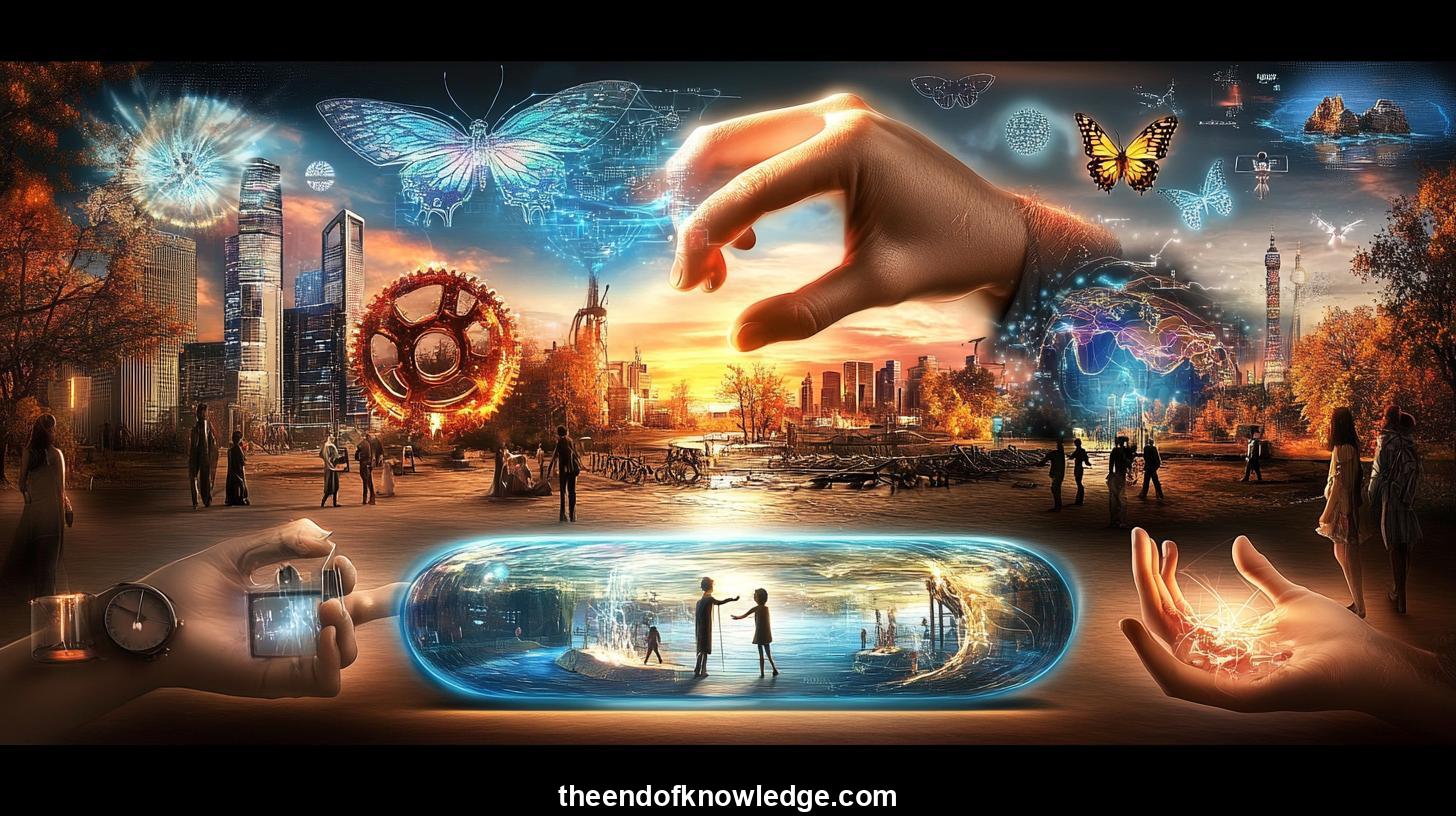Genesis of the synthetic era : redesigning our world with artificial intelligence
graph LR
classDef ethics fill:#f9d4d4, font-weight:bold, font-size:14px;
classDef tech fill:#d4f9d4, font-weight:bold, font-size:14px;
classDef education fill:#d4d4f9, font-weight:bold, font-size:14px;
classDef governance fill:#f9f9d4, font-weight:bold, font-size:14px;
classDef adaptation fill:#f9d4f9, font-weight:bold, font-size:14px;
A[Vault7-68] --> B[Ethics: privacy, control,
human agency. 3,6,10,18]
A --> C[Tech impact: inequality,
human disconnection. 7,21,22,28]
A --> D[Education: lifelong learning,
creativity focus. 4,15,27]
A --> E[AI governance: regulation,
global standards. 13,23]
A --> F[Human adaptation: cognitive
evolution, survival. 5,16,20,30]
A --> G[Existential questions: identity,
consciousness redefined. 8,24,26]
B --> H[Genetic manipulation risks. 6]
B --> I[Biometric surveillance threats. 18]
C --> J[Augmented humans, new species. 12]
C --> K[AI economies deepen divides. 22]
D --> L[Shift to adaptability training. 15]
E --> M[Corporate accountability needed. 13]
F --> N[Machine collaboration necessity. 29]
G --> O[Synthetic realities challenge existence. 21,24]
G --> P[Redefining human purpose. 9,25]
H --> Q[Ethical guidelines essential. 10]
I --> R[Neural interface freedoms. 18]
J --> S[Tech-biology fusion outcomes. 12]
K --> T[Social inequality risks. 7]
L --> U[Emotional intelligence priority. 11,27]
M --> V[Equitable access focus. 13]
N --> W[Balance innovation-ethics. 19]
O --> X[Disconnection from experiences. 21]
P --> Y[Human essence preservation. 20]
Q --> Z[Dignity protection imperative. 10]
R --> AA[Freedom vs surveillance. 18]
S --> BB[Augmented evolution paths. 12]
T --> CC[Eroded human connections. 7]
U --> DD[Creative intelligence emphasis. 27]
V --> EE[Prevent AI misuse. 13]
W --> FF[Philosophical framework needed. 26]
X --> GG[Reality perception shifts. 8]
Y --> HH[Tech-human coexistence. 20]
Z --> II[Global cooperation required. 23]
class A,B ethics;
class C,J,S,T,CC tech;
class D,L,U,DD education;
class E,M,V,EE governance;
class F,N,W adaptation;
class G,O,P,X,Y,GG,HH,FF existential;
Resume:
The discussion delves into the transformative impact of the synthetic era, driven by artificial intelligence and technological advancements. It explores how these technologies are reshaping industries, education, and human identity, emphasizing the need for ethical considerations and regulatory frameworks. The conversation highlights the potential for both positive evolution and dystopian scenarios, urging a focus on human values and purpose in a rapidly changing world.
The synthetic era represents a fusion of physical, digital, and biological realms, challenging traditional notions of reality and identity. Artificial intelligence and generative technologies are central to this transformation, offering immense possibilities but also raising concerns about privacy, control, and the future of human agency. The discussion underscores the importance of balancing technological progress with ethical considerations to avoid a dystopian outcome.
The role of education and cognitive evolution is critical in navigating this new landscape. As machines become more intelligent, humans must adapt by developing new skills and embracing lifelong learning. The conversation emphasizes the need for a paradigm shift in how societies value knowledge, creativity, and critical thinking, ensuring that technology complements rather than replaces human potential.
The ethical implications of synthetic life and artificial intelligence are profound. The discussion touches on issues such as genetic manipulation, biometric surveillance, and the potential for technological dominance over human autonomy. It highlights the risks of unchecked technological advancement and the importance of establishing ethical guidelines to protect human dignity and freedom.
The future of humanity in a synthetic world hinges on the ability to redefine purpose and values. As technology reshapes industries and societies, there is a growing need for introspection about what it means to be human. The conversation advocates for a focus on empathy, creativity, and emotional intelligence as essential qualities that cannot be replicated by machines.
Ultimately, the synthetic era presents both opportunities and challenges. While it promises advancements in healthcare, education, and productivity, it also threatens to exacerbate inequalities and erode human connection. The discussion concludes with a call to action, urging individuals and societies to actively shape this future by embracing innovation while preserving the essence of humanity.
30 Key Ideas:
1.- The synthetic era integrates physical, digital, and biological realms, redefining human existence.
2.- Artificial intelligence and generative technologies drive this transformation, offering vast possibilities.
3.- Ethical concerns arise, including privacy, control, and human agency in a tech-dominated world.
4.- Education must evolve to emphasize lifelong learning and critical thinking.
5.- Cognitive adaptation is crucial as machines surpass human intelligence in certain tasks.
6.- Genetic manipulation and biometric surveillance raise ethical and privacy concerns.
7.- Technological advancements risk exacerbating social inequalities and eroding human connection.
8.- Synthetic life challenges traditional notions of identity and reality.
9.- The future of humanity requires redefining purpose and values in a tech-driven world.
10.- Ethical guidelines are essential to protect human dignity and freedom.
11.- Empathy and emotional intelligence are vital human qualities that machines cannot replicate.
12.- The fusion of technology and biology may lead to new species or augmented humans.
13.- Governments and corporations must regulate AI to prevent misuse and ensure equitable access.
14.- Synthetic identities and digital personas blur the lines between human and machine.
15.- The role of education shifts to fostering creativity and adaptability.
16.- Critical thinking and introspection are necessary to navigate the synthetic era.
17.- Technological dominance threatens human autonomy and decision-making power.
18.- Biometric data and neural interfaces raise concerns about personal freedom.
19.- The synthetic era demands a balance between innovation and ethical responsibility.
20.- Humanity must preserve its essence while embracing technological advancements.
21.- Synthetic realities may lead to a disconnection from physical and emotional experiences.
22.- AI-driven economies risk creating a world of haves and have-nots.
23.- The ethical use of AI requires global cooperation and unified standards.
24.- Synthetic life challenges traditional definitions of consciousness and existence.
25.- Human values must guide technological development to ensure a positive future.
26.- The synthetic era necessitates a new philosophical framework for understanding reality.
27.- Education systems must prioritize emotional and creative intelligence.
28.- Synthetic technologies may deepen societal divides if not equitably distributed.
29.- The future of work requires humans to collaborate with machines effectively.
30.- Humanity's ability to adapt and evolve will determine its survival in the synthetic era.
Interviews by Plácido Doménech Espí & Guests - Knowledge Vault built byDavid Vivancos 2025
 >
>